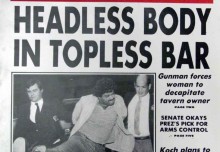We all use superlatives, even if we don’t know the term.
A superlative is a fancy way of saying something is the absolute best it can be – typical examples are:
- most
- best
- top
- fastest
- ultimate
- premier
- most trusted.
However, a good writer should never use them except if they can be proven.
The reason is simple: although writers think superlatives impress, they usually ring alarm bells for readers with half a brain.
After all, most people have highly honed bullshit detectors. When readers see a statement such as “We have the best burgers in town” they’re not impressed – instead, they question the truth of the statement.
Facts are always more interesting.
For example, if a leading reviewer votes your burger as the best in the city, then by all means say so. If your burgers are made from organic wagyu beef, say so.
The idea is to show, don’t tell. Rather than saying you’re awesome, show why you are through facts.
In other words, if you’re genuinely good, prove it. If not, no amount of marketing – however much it grandstands – will help you.
Don’t use hyperbole
The definition of hyperbole is to exaggerate – such as by saying you’re the greatest president ever. Superlatives are often hyperbolic, but hyperbole can also take other forms.
For example, if you’re in a bar and someone serves you a beer, then replying with “Thanks, that’s awesome” is hyperbole since it’s not actually awesome. Parting the red sea is awesome – getting a beer that you paid for is business as usual.
We constantly use – and abuse – hyperbole, and the problem is it diminishes the power of the words. It also – yet again – sets off readers’ bullshit detectors.
Some hyperbolic words to watch out for are:
- state of the art
- prestigious
- high quality
- epic
- historic
- fantastic
- tremendous
- famous.
If these words are true then it’s not hyperbolic to say them – for example, if Madonna wants to say she’s famous then she’s simply being truthful. Yet if something is obvious it’s usually not said at all – which is why using hyperbole can backfire.
A good rule of thumb is this: if the opposite of something is absurd, then don’t say anything. After all, would you say your product is low quality? Of course not – so there’s no need to say it’s high quality.
Saying something is famous is especially common in hospitality PR. Whenever I see “famous” in a press release it makes me think of a greasy fried chicken shop I used to pass every day on my way to work. The place was old, dilapidated, its glass windows greasy and its sign proudly claimed that its chicken was famous.
Contrast this to places that are genuinely famous. Does Heston Blumenthal, for example, call The Fat Duck famous? No – because he doesn’t have to.
That’s the perk of being famous.
Improve your writing with this practical, self-paced online course
The Writing Essentials online course will explain how you can:
- write in the active voice
- use positive language
- cut copy
- make your intros stronger
- write in plain English
- use the right tone of voice and style
- write in the inverted pyramid style
- know what makes a story interesting
- frontload content
- spot common grammar and punctuation mistakes
- proofread your own work
- write great headlines.
To keep things lively – and make sure you’ve absorbed what you’ve just learnt – there are also plenty of exercises throughout the course.
Equivalent to a full-day workshop, there are six sessions that each take between 45 minutes to an hour and a half.
Enrol now in the Writing Essentials online course



